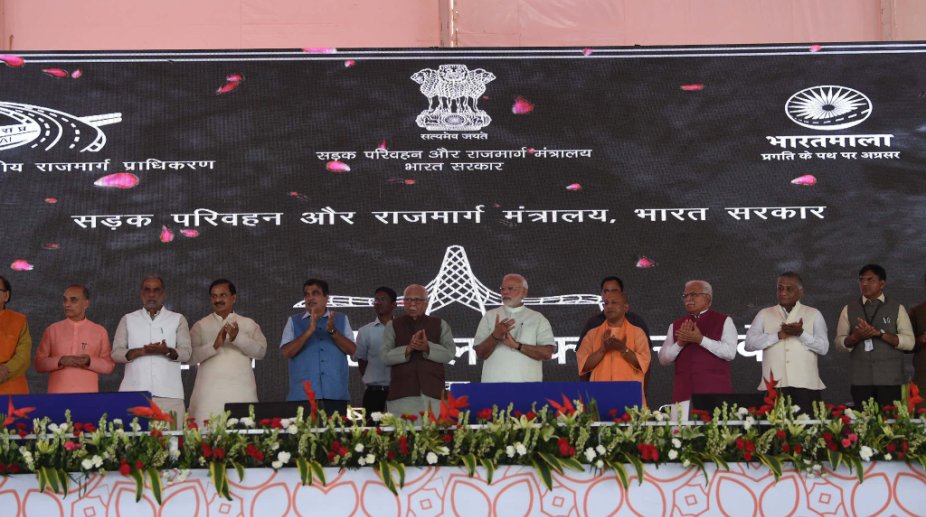After inaugurating the first phase of the 14-lane Delhi-Meerut Expressway, Prime Minister Narendra Modi dedicated the 135-km-long Eastern Peripheral Expressway (EPE) to the nation. Accompanied by Union Minister of Road Transport and Highways Nitin Gadkari, the PM arrived in Baghpat in western Uttar Pradesh, to participate in the ceremony which also had in attendance Uttar Pradesh Chief Minister Yogi Adityanath and Haryana Chief Minister ML Khattar.
At the political rally, the PM spoke on the various achievements of his government in the field of infrastructure.
Advertisement
“I bow to the country men for their faith in my government for the last four years,” said the PM, setting the mood for the campaign for the Lok Sabha elections in 2019.
“I experienced today how the 14-lane expressway will make life easier for the people of Delhi-NCR. There is no hindrance along the way. The EPE and the Delhi-Meerut expressway have been built using the latest technology,” said Modi.
“It will be very easy to transport farm produce and milk between western UP and Delhi,” underlined the ‘vikas’ objective of his government.
He took the opportunity to criticise the UPA government. “Just 12 km highway was constructed per day till four years ago. We now built around 27 km highway per day,” he said.
At the inauguration, the PM highlighted the achievements of his government, including allotment made for the various projects, the Bharat Mala project, expansion of rail and air network, and defence industrial corridor.
The EPE originates from Kundli on NH-1 in Haryana and stretches up to Palwal on NH-2. The PM had laid the foundation for this project on 5 November 2015.
A total of 1,700 hectares of land has been acquired for the EPE at a cost of about Rs 5,900 crore. The construction cost of the project is about Rs 4,618 crore.
The expressway has been completed in a record time of about 500 days against the scheduled target of 910 days.
The project of peripheral expressways around Delhi, comprising western peripheral expressway (WPE) and eastern peripheral expressway (EPE), connecting NH-1 and NH-2 from western and eastern side of Delhi, has been envisaged with the twin objectives of decongesting and de-polluting the national capital by diverting the traffic not destined for Delhi.
It is a fully access-controlled six-lane expressway. Entry and exit on the expressway is through designated interchanges only. The expressway has 4 major bridges, 46 minor bridges, 3 flyovers, 7 inter-changes, 221 underpasses, 8 ROBs, and 114 culverts.
The EPE has a closed tolling system in which toll will be collected only for the distance travelled and not for the entire length. Toll plazas will be equipped with Electronic Toll Collection (ETC) system for faster toll collection and uninterrupted travel experience. Weigh-in-Motion (WIMs) equipment have been installed at all 30 entry points of the Expressway to stop entry of over-loaded vehicles.
This is the first expressway in the country to use solar power on the entire length of 135 km. There are eight solar power plants on this Expressway, with a capacity of 4000 KW (4 megawatt) for lighting of the underpasses and running solar pumps for watering plants.
Rainwater harvesting has been provided at every 500 meters on the EPE and there is drip irrigation for plants all along the expressway. There are also 36 replicas of monuments depicting Indian culture and heritage.
Earlier today, the PM inaugurated the Delhi-Meerut Expressway and held a short road show at New Delhi.
The expressway, which has been dubbed by the government as ‘Green Smart Expressway, has facilities such as rainwater harvesting and trees to help reduce pollution. A 2.5-metre-wide cycle track on either side of the highway, a vertical garden on the Yamuna Bridge, solar lighting system and watering of plants through drip irrigation only are among the unique features of the expressway.
Read More: PM Modi inaugurates first phase of Delhi-Meerut expressway
Once the entire project is complete, it will take just 60 minutes to travel from Delhi to Meerut. The foundation stone for the expressway was laid by the PM Modi on 31 December 2015.









